
The Holy Father accepted the resignation of Amarillo Bishop Patrick Zurek, who has reached retirement age.


The Holy Father accepted the resignation of Amarillo Bishop Patrick Zurek, who has reached retirement age.

![Mother of boy healed through intercession of Fulton Sheen celebrates his upcoming beatification #Catholic Bonnie Engstrom, the mother of the child who was healed through Archbishop J. Fulton Sheen’s intercession, said she “laughed out loud with joy” when she heard his beatification was going to move forward.On Feb. 9, the Holy See officially informed Bishop Louis Tylka of the Diocese of Peoria, Illinois, that the cause for the Venerable Servant of God Archbishop Fulton J. Sheen can proceed to beatification. He is credited for the miracle that saved the life of Engstrom’s son James Fulton Engstrom, who was named after Sheen.“We had started getting to know Fulton Sheen and growing in our devotion to him while I was pregnant with James,” Engstrom said in a Feb. 13 interview with “EWTN News In Depth.” “During that pregnancy we had decided to name our son after him … to really put him under his patronage.”On Sept. 16, 2010, James was born at home. It had been a healthy pregnancy, and it was a healthy labor, but there was a knot in James’ umbilical cord that tightened during birth. “He was a stillborn, there was absolutely no sign of life,” Engstrom said.In the “time of crisis, I was in a state of shock,” she said. “I didn’t really know what to do, but I remember calling on Fulton Sheen, just saying his name, ‘Fulton Sheen, Fulton Sheen, Fulton Sheen.’”“While [James] was at home, while he was in the ambulance, and while he was at the hospital in the emergency room, he did not have a pulse for that entire time,” she said. “Right as the medical team was ready to call time of death, all hands were off. And at that moment, his heart started to beat again, and it never stopped after that.”James is a freshman in high school and doing “great,” Engstrom said. “He is doing really well. He loves music. He’s in an art class that he’s really enjoying … he’s a great kid. Hardworking, funny.”While James “has had some medical issues along the way,” there is nothing the family can attribute to his health issues at birth.Engstrom said that her son’s “initial MRI, the first 24 hours of his life, showed extensive brain damage, and the follow-up one was perfectly clear.”Sheen’s beatificationSheen’s cause for canonization was first opened in 2002 under the leadership of the Diocese of Peoria, Sheen’s birthplace, and from then on he was referred to as a servant of God. Pope Benedict XVI declared him venerable in June 2012.On March 6, 2014, the board of medical experts who advise the then-Congregation for the Causes of Saints unanimously approved the reported miracle of James. Pope Francis approved of the miracle of Sheen’s on July 5, 2019, and the beatification experienced numerous delays due to an ownership dispute of his remains and an investigation into clergy sex abuse in New York.While obstacles were eventually cleared, Engstrom said initially her family was “frustrated” and “disappointed” with the delays. “I think as things in the Church just continue to progress and time went by, we realized, we trust in Jesus and he’s got it in control. And so we were able to really lean into that and move past the initial disappointment,” she said.The family is “so excited,” Engstrom said. "We’re so happy about it.” “We really appreciate that in all of Church history, our family has a little footnote in it in a very special way, and it’s remarkable. It is such an honor, and it’s such a joyful thing,” she said. Mother of boy healed through intercession of Fulton Sheen celebrates his upcoming beatification #Catholic Bonnie Engstrom, the mother of the child who was healed through Archbishop J. Fulton Sheen’s intercession, said she “laughed out loud with joy” when she heard his beatification was going to move forward.On Feb. 9, the Holy See officially informed Bishop Louis Tylka of the Diocese of Peoria, Illinois, that the cause for the Venerable Servant of God Archbishop Fulton J. Sheen can proceed to beatification. He is credited for the miracle that saved the life of Engstrom’s son James Fulton Engstrom, who was named after Sheen.“We had started getting to know Fulton Sheen and growing in our devotion to him while I was pregnant with James,” Engstrom said in a Feb. 13 interview with “EWTN News In Depth.” “During that pregnancy we had decided to name our son after him … to really put him under his patronage.”On Sept. 16, 2010, James was born at home. It had been a healthy pregnancy, and it was a healthy labor, but there was a knot in James’ umbilical cord that tightened during birth. “He was a stillborn, there was absolutely no sign of life,” Engstrom said.In the “time of crisis, I was in a state of shock,” she said. “I didn’t really know what to do, but I remember calling on Fulton Sheen, just saying his name, ‘Fulton Sheen, Fulton Sheen, Fulton Sheen.’”“While [James] was at home, while he was in the ambulance, and while he was at the hospital in the emergency room, he did not have a pulse for that entire time,” she said. “Right as the medical team was ready to call time of death, all hands were off. And at that moment, his heart started to beat again, and it never stopped after that.”James is a freshman in high school and doing “great,” Engstrom said. “He is doing really well. He loves music. He’s in an art class that he’s really enjoying … he’s a great kid. Hardworking, funny.”While James “has had some medical issues along the way,” there is nothing the family can attribute to his health issues at birth.Engstrom said that her son’s “initial MRI, the first 24 hours of his life, showed extensive brain damage, and the follow-up one was perfectly clear.”Sheen’s beatificationSheen’s cause for canonization was first opened in 2002 under the leadership of the Diocese of Peoria, Sheen’s birthplace, and from then on he was referred to as a servant of God. Pope Benedict XVI declared him venerable in June 2012.On March 6, 2014, the board of medical experts who advise the then-Congregation for the Causes of Saints unanimously approved the reported miracle of James. Pope Francis approved of the miracle of Sheen’s on July 5, 2019, and the beatification experienced numerous delays due to an ownership dispute of his remains and an investigation into clergy sex abuse in New York.While obstacles were eventually cleared, Engstrom said initially her family was “frustrated” and “disappointed” with the delays. “I think as things in the Church just continue to progress and time went by, we realized, we trust in Jesus and he’s got it in control. And so we were able to really lean into that and move past the initial disappointment,” she said.The family is “so excited,” Engstrom said. "We’re so happy about it.” “We really appreciate that in all of Church history, our family has a little footnote in it in a very special way, and it’s remarkable. It is such an honor, and it’s such a joyful thing,” she said.](https://unitedyam.com/wp-content/uploads/2026/02/mother-of-boy-healed-through-intercession-of-fulton-sheen-celebrates-his-upcoming-beatification-catholic-bonnie-engstrom-the-mother-of-the-child-who-was-healed-through-archbishop-j-fulton-sheen.png)
Bonnie Engstrom, the mother of boy healed through the intercession of Fulton Sheen, provides an update on her son following the announcement of the archbishop’s upcoming beatification.
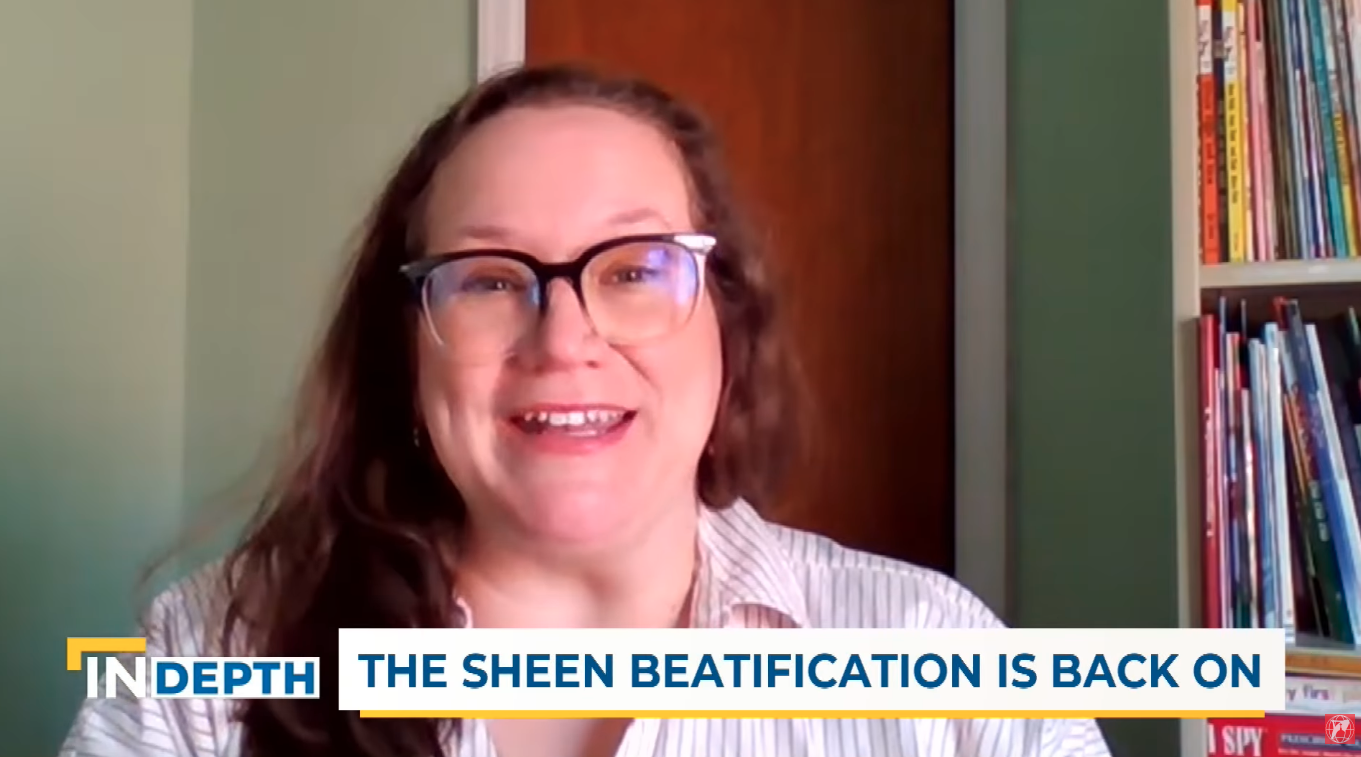

Parishioners learned that seven churches will be closed in March due to financial constraints and lower Mass attendance.

![Seattle, Boston archbishops make friendly wager ahead of 2026 Super Bowl #Catholic It’s become an annual tradition for the Catholic bishops from the two cities sending teams to the Super Bowl to make a friendly wager before the big game to benefit Catholic nonprofits in the teams’ cities.As the New England Patriots and the Seattle Seahawks prepare to play in the Super Bowl on Feb. 8, Archbishop Richard G. Henning of Boston and Archbishop Paul D. Etienne of Seattle discussed this year’s wager with EWTN News.The two archbishops said the weekend will be fun for fans across the nation but acknowledged it comes amid a tense time in the United States with ongoing debates and division surrounding immigration.“I think this is an important moment, obviously, of unity. This is a shared cultural moment, hopefully a moment for people to gather, be with friends and family, a joyful thing,” Henning said. “But at the same time, we don’t want to forget that there are other realities in our world and suffering; [we want to] be attentive to that as well.”“It’s a situation that requires attentiveness and sensitivity,” Etienne said. With the “tradition of a friendly wager between the bishops of the teams, Archbishop Henning and I just simply wanted to acknowledge that we do realize we got more important matters that we are being attentive to,” he said.“But at the same time, we recognize the great role that sports and relaxation play in the lives of our people, too.”The pair decided the wager this year would be a $500 donation to Catholic charities that have a particular focus on the care and support of immigrants.Preparing for a ‘joyful’ gameEtienne discussed how putting aside differences and coming together is an advantage that sports and recreation can bring.“Healthy competition is a part of so many aspects of human life, and it’s good for people to have something to take their minds off of other matters in their world and in their lives to just relax. And hopefully, the outcome of the game will still allow everybody watching it and participating to still be relaxed and joyful at the performance of their teams,” he said.The 60th Super Bowl marks the second time the Seahawks and Patriots will compete in the championship game. In 2015, the Patriots defeated the Seahawks at the 49th Super Bowl. Despite the loss, Etienne said “there is definitely a better performance on the way this year” for Seattle’s team.Etienne said Seattle players see it as a “good omen” that in the 21st century, every time a new pope has been elected, the Seahawks made it to the next Super Bowl.When Pope Benedict XVI was elected in April 2005, the Seahawks played in the Super Bowl in February 2006. Then Pope Francis was elected in March 2013, and the Seahawks played in the Super Bowl in 2014. In May 2025, Pope Leo XIV was elected and now Seattle’s team is once again in the championship game.While Henning has only been in Boston a little over a year after moving from New York, he said he is “absolutely a fan” of the New England Patriots and said they are “a great team.”“This is a team that unites New England and Boston. It’s a team that is committed to young people in our communities. They give a great example of hard work, resilience, discipline, and the team is very generous in going out into our communities among our young people, helping them with their sports programs,” Henning said.“It’s a great team, a great management, a great coach who’s a wonderful witness of Catholic faith, Coach [Mike] Vrabel. So, I’m very much a fan of them in every way,” Henning said.The teams are schedule to compete on Sunday, Feb. 8, at Levi’s Stadium in Santa Clara, California. Seattle, Boston archbishops make friendly wager ahead of 2026 Super Bowl #Catholic It’s become an annual tradition for the Catholic bishops from the two cities sending teams to the Super Bowl to make a friendly wager before the big game to benefit Catholic nonprofits in the teams’ cities.As the New England Patriots and the Seattle Seahawks prepare to play in the Super Bowl on Feb. 8, Archbishop Richard G. Henning of Boston and Archbishop Paul D. Etienne of Seattle discussed this year’s wager with EWTN News.The two archbishops said the weekend will be fun for fans across the nation but acknowledged it comes amid a tense time in the United States with ongoing debates and division surrounding immigration.“I think this is an important moment, obviously, of unity. This is a shared cultural moment, hopefully a moment for people to gather, be with friends and family, a joyful thing,” Henning said. “But at the same time, we don’t want to forget that there are other realities in our world and suffering; [we want to] be attentive to that as well.”“It’s a situation that requires attentiveness and sensitivity,” Etienne said. With the “tradition of a friendly wager between the bishops of the teams, Archbishop Henning and I just simply wanted to acknowledge that we do realize we got more important matters that we are being attentive to,” he said.“But at the same time, we recognize the great role that sports and relaxation play in the lives of our people, too.”The pair decided the wager this year would be a $500 donation to Catholic charities that have a particular focus on the care and support of immigrants.Preparing for a ‘joyful’ gameEtienne discussed how putting aside differences and coming together is an advantage that sports and recreation can bring.“Healthy competition is a part of so many aspects of human life, and it’s good for people to have something to take their minds off of other matters in their world and in their lives to just relax. And hopefully, the outcome of the game will still allow everybody watching it and participating to still be relaxed and joyful at the performance of their teams,” he said.The 60th Super Bowl marks the second time the Seahawks and Patriots will compete in the championship game. In 2015, the Patriots defeated the Seahawks at the 49th Super Bowl. Despite the loss, Etienne said “there is definitely a better performance on the way this year” for Seattle’s team.Etienne said Seattle players see it as a “good omen” that in the 21st century, every time a new pope has been elected, the Seahawks made it to the next Super Bowl.When Pope Benedict XVI was elected in April 2005, the Seahawks played in the Super Bowl in February 2006. Then Pope Francis was elected in March 2013, and the Seahawks played in the Super Bowl in 2014. In May 2025, Pope Leo XIV was elected and now Seattle’s team is once again in the championship game.While Henning has only been in Boston a little over a year after moving from New York, he said he is “absolutely a fan” of the New England Patriots and said they are “a great team.”“This is a team that unites New England and Boston. It’s a team that is committed to young people in our communities. They give a great example of hard work, resilience, discipline, and the team is very generous in going out into our communities among our young people, helping them with their sports programs,” Henning said.“It’s a great team, a great management, a great coach who’s a wonderful witness of Catholic faith, Coach [Mike] Vrabel. So, I’m very much a fan of them in every way,” Henning said.The teams are schedule to compete on Sunday, Feb. 8, at Levi’s Stadium in Santa Clara, California.](https://unitedyam.com/wp-content/uploads/2026/02/seattle-boston-archbishops-make-friendly-wager-ahead-of-2026-super-bowl-catholic-its-become-an-annual-tradition-for-the-catholic-bishops-from-the-two-cities-sending-teams-to-the-super-bowl.jpg)
Seattle and Boston archbishops place a wager ahead of the Super Bowl while also acknowledging the big game comes amid a difficult time for many across the nation.


Some Catholic colleges ranked among the best for pro-life support for women, while others were among the worst for their ties to abortion clinics, according to a new report.
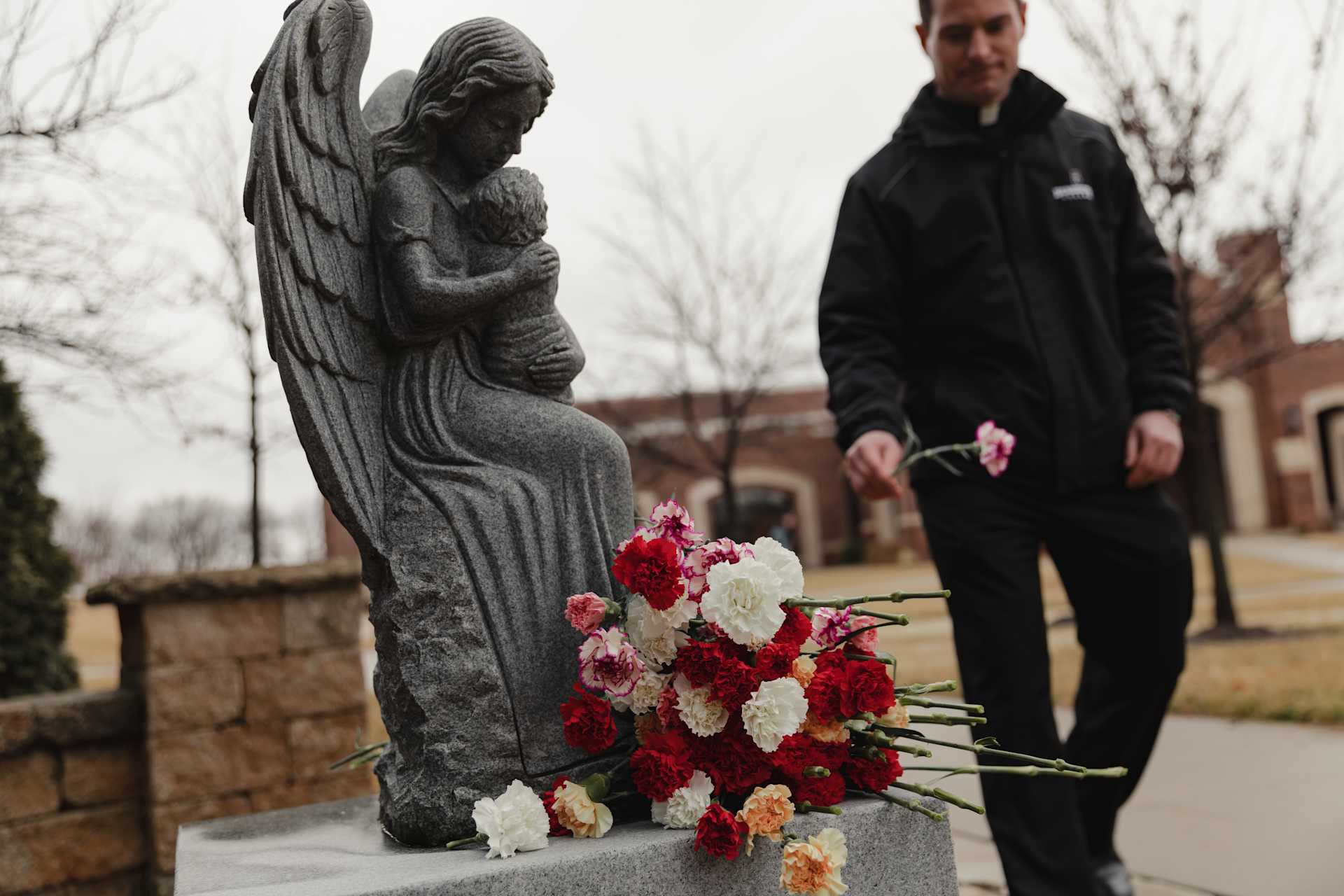
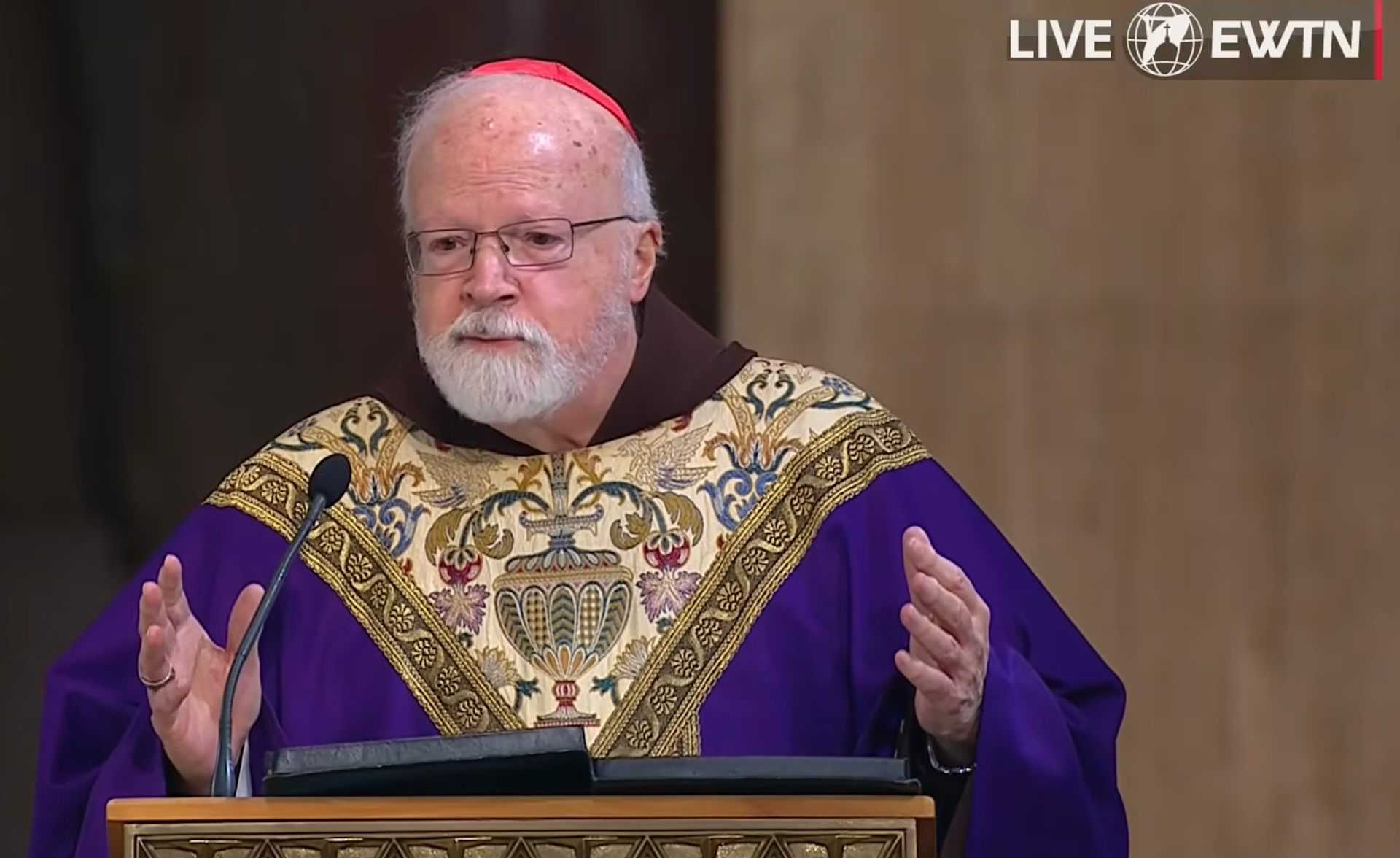

Jan 23, 2026 / 10:34 am (CNA).
Cardinal Seán P. O’Malley said life is a “precious gift from a loving God” ahead of the 2026 annual March for Life.
O’Malley, archbishop emeritus of Boston, celebrated Mass on Jan. 23 before the March for Life, concluding the annual National Prayer Vigil for Life at the Basilica of the National Shrine of the Immaculate Conception in Washington, D.C.
“I know that many of you are tired and have made many sacrifices to be here,” O’Malley said. “I assure you, you could not be doing anything more important than being here today. And your presence is not by accident. The Lord in his providence has brought all of us here today.”
The Mass featured prayers for the pro-life movement and provided a moment to strengthen commitment to defending human life ahead of the march.
“Abortion is the greatest moral crisis faced by our country and by our world. It’s a matter of life and death in a very grand scale," O’Malley said. “It’s been a joy and a privilege for me to be at every March for Life here in Washington for the past 53 years.”
“It’s such a joy to be with you here today in this March for Life. This is a pilgrimage for life, and it begins with prayer, here in Mary’s shrine. I thank God for all of you,” he said.
O’Malley spoke about the 2026 March for Life theme: “Life Is a Gift.”
“What a powerful theme,” O’Malley said. “Sadly, life is not always seen as a gift. For some, it seems a burden or a curse.”
The cardinal detailed a recent poll that found “for the very first time in the history of our nation, the majority of Americans say they do not want to have children.” O’Malley called it “an alarming statistic.”
“Life is a gift, a gift given by a loving God,” he said. “Life is beautiful, especially when it is received with gratitude and love.”
We must “love as God loves,” O’Malley said. “We must love first, forgive first, give first. That’s why we’re here in this Mass for life.”
“We’re here because life is a gift. God has given us this precious gift. We must be grateful and express our gratitude by proclaiming the gospel of life,” he said.
O’Malley, who has been active in the pro-life movement for decades, said the opposition once believed the pro-life advocates would “die off,” but “we’re still here, proclaiming the gospel of life.”
“Our mission is not a political crusade. It’s a response to God’s command to love and to care for each other. And God bless us, the crowd is getting younger and younger. You are beautiful,” he said.
To end abortion, “our task is not to judge others but to bring healing,” O’Malley said. We must be “gentle” like Jesus was with “the Samaritan woman, the poor, the tax collector, the adulterous woman, the good thief,” he said.
“Our task is to build a society that takes care of everybody, where every person counts, where every life is important. Political polarization, racism, economic injustice will only continue to fuel abortion in a post-Roe v. Wade world,” O’Malley said.
“Our world is wracked by divisions and violence. Pope Leo is inviting us to be messengers of unity and of peace. But we do not want to get in the way of the message,” O’Malley said.
“Together, we can protect and nurture that gift of life. We must look for opportunities to be apostles of life, building a civilization of love and ethic of care,” he said.
“The antidote to abortion is love. Love manifests in community, compassion, and solidarity. Life is a gift. Every person is a gift. Every person counts. All are important. Our mission is to work so that no child be left behind. Every baby will be welcomed, loved, cared for, nurtured, and protected,” he said.
“Thank God for the gift of life. Thank God for love. Thank God for you,” O’Malley concluded.
EWTN News’ coverage of the 2026 March for Life can be found here.
If you’re attending the March for Life, don’t forget to use #ewtnprolife on all your posts across X, TikTok, Instagram, and Facebook!
Want to relive interviews and special moments from the march? Visit ewtnnews.com/watch and subscribe to youtube.com/@EWTNNews for full coverage.
Read More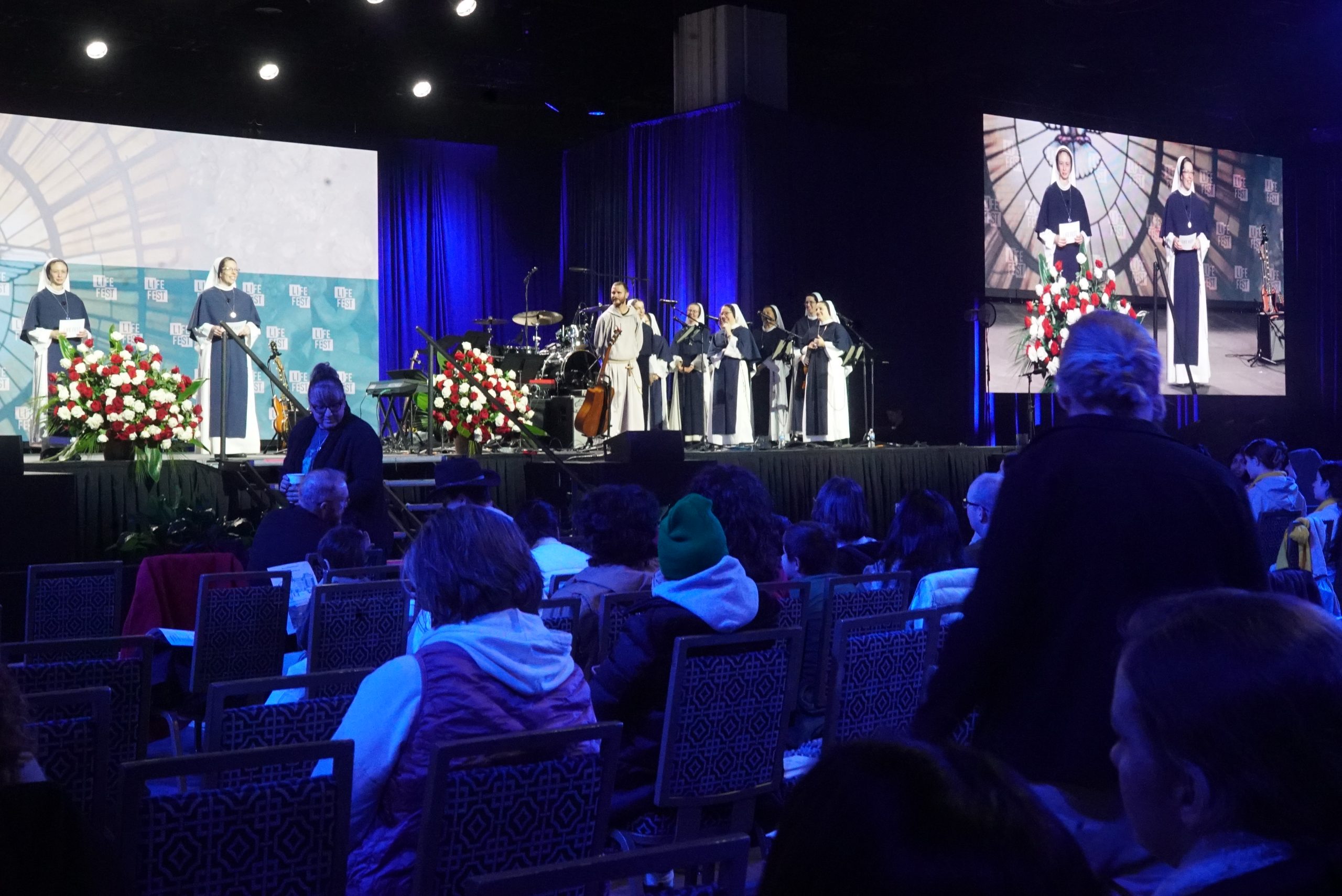

Jan 23, 2026 / 09:34 am (CNA).
Young Catholics who traveled from across the country for the March for Life started their day singing and praying with the Sisters of Life early Friday morning.
Life Fest 2026 participants gathered at the Gaylord National Resort and Convention Center in Oxon Hill, Maryland, to get energized, sing songs, and receive the sacraments before heading to the National Mall for the March for Life 2026.

The event, organized by the Sisters of Life and Knights of Columbus, began at 6 a.m. with music, pro-life testimonies, and chances to go to confession and venerate the relics of numerous saints. Several nuns played music as a part of the All the Living Band alongside Father Isaiah Marie Hofmann, CFR, while participants in the crowd sang along and clapped.
The crowd included everyone from young children to elderly people, Sisters of Life, Dominican brothers and priests, and the Knights of Columbus, who sponsored the event.
Students from Lansing Catholic High School in Lansing, Michigan, waited in a line to venerate relics of St. Carlos Acutis and St. John Paul II.

The event featured pro-life testimony from women and families who experienced crisis pregnancies and chose life, including the Schachle family, whose son Michael McGivny Schachle, who helped make his namesake a “blessed” through the miracle of his birth.
Schachle’s parents, Michelle and Daniel, gave their testimony while he stood alongside them on stage.
If you’re attending the March for Life, don’t forget to use #ewtnprolife on all your posts across X, TikTok, Instagram, and Facebook!
Want to relive interviews and special moments from the march? Visit ewtnnews.com/watch and subscribe to youtube.com/@EWTNNews for full coverage.
Read More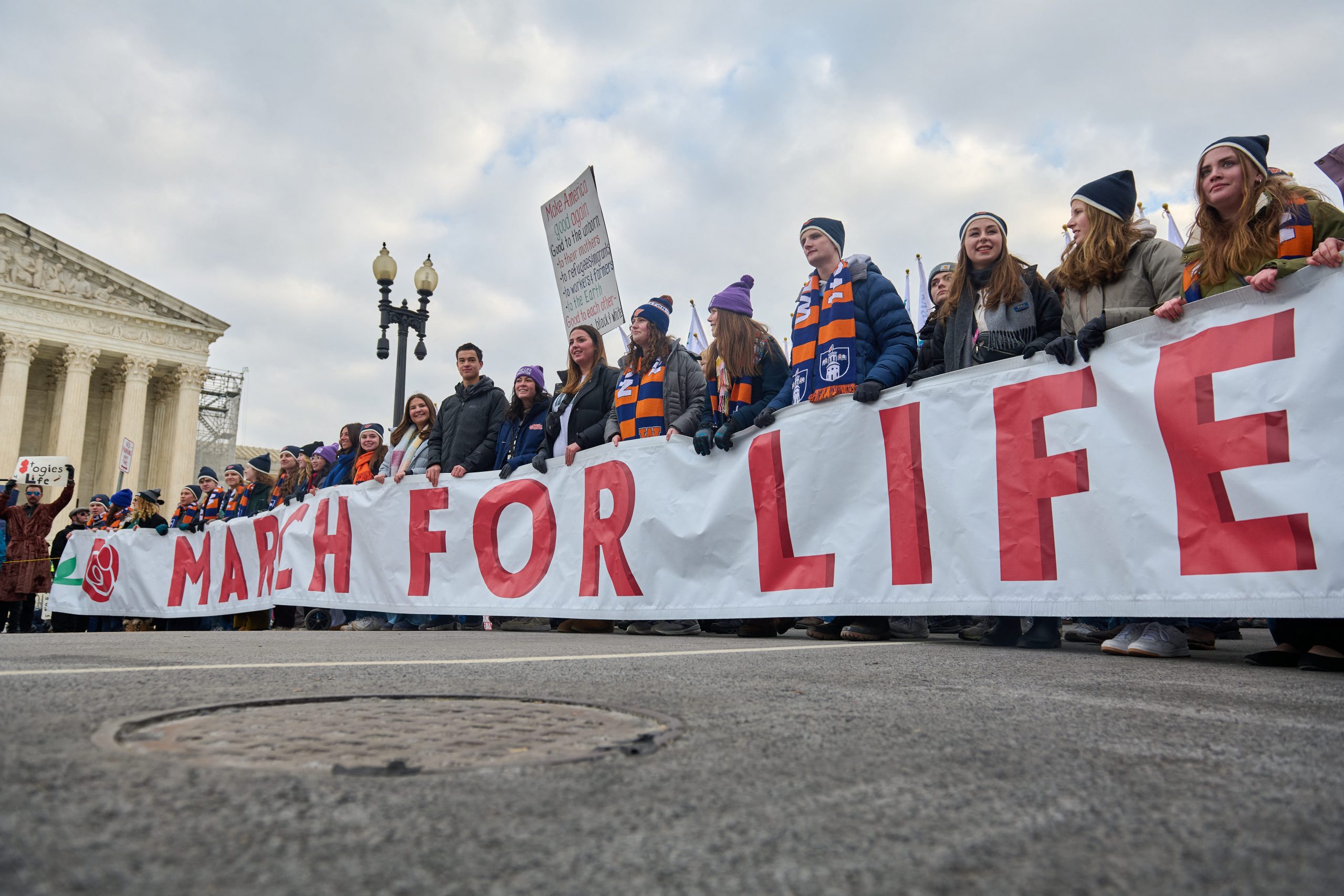

Jan 21, 2026 / 06:00 am (CNA).
With tens of thousands of pro-life Americans gathering for the 53rd annual March for Life in Washington, D.C., on Friday, Jan. 23, EWTN will provide live coverage of the event.
The yearly national pro-life event marks the anniversary of Roe v. Wade, drawing together thousands to protest abortion and advocate for life. This year’s theme is “Life Is a Gift,” which the March for Life official website says emphasizes the “unshakeable conviction that life is very good and worthy of protection, no matter the circumstances.”
5 p.m. ET: EWTN’s National March for Life coverage kicks off before the march with a night of prayer at the Basilica of the National Shrine of the Immaculate Conception. The National Prayer Vigil for Life is held annually on the eve of the March for Life, bringing thousands of pilgrims across the nation together to pray for an end to abortion.
At 5 p.m. ET, EWTN will stream the opening Mass followed by the Holy Hour of the National Prayer Vigil for Life at 7 p.m. as pro-lifers pray and prepare for the upcoming march.
8 a.m. ET: The all-night prayer vigil will conclude with the closing Mass of the National Prayer Vigil for Life at the shrine, televised live by EWTN.
9:30 p.m. to 4:30 p.m. ET: EWTN will air coverage of the March for Life, featuring a keynote by Sarah Hurm, a single mom of four who went through a chemical abortion reversal to save the life of her child.
Other speakers include Speaker of the House Mike Johnson, R-Louisiana; Rep. Chris Smith, R-New Jersey; and March for Life President Jennie Bradley Lichter. The march will also feature pro-life entrepreneurs including Shawnte Mallory, founder of Labir Love And Care, and Debbie Biskey, CEO of Options for Her, as well as student activist Elizabeth Pillsbury Oliver, a convert to Catholicism who heads Georgetown University’s Right to Life group.
Rev. Irinej Dobrijevic, a Serbian Orthodox bishop of the Diocese of Eastern America, and Cissie Graham Lynch, spokesperson for the Billy Graham Evangelistic Association, will also speak at the event.
In addition, the Christian band Sanctus Real will perform at the rally and the Friends of Club 21 choir — a chorus of young adults with Down syndrome — will perform the national anthem.
4 p.m. ET: EWTN will broadcast the second annual Life Fest Mass, sponsored by the Sisters of Life and the Knights of Columbus as part of the Life Fest Rally. The Life Fest Rally begins the evening before the march with live music from Matt Maher and other Christian bands.
2:30 p.m. ET: The 21st annual Walk for Life West Coast will begin with a rally followed by the walk. EWTN will livestream coverage of the walk.
5 p.m. ET: EWTN will televise highlights from One Life (Una Vida), a one-day event centered on witnessing human dignity with a focus on the pro-life issues as well as other issues such as human trafficking and homelessness. The coverage will be hosted by Astrid Bennett and Patricia Sandoval, along with EWTN producers, during the march.
8 p.m. ET: EWTN will televise a pro-life Mass from Los Angeles, concluding the weekend’s pro-life coverage.
Read More

Jan 16, 2026 / 16:40 pm (CNA).
Vice President JD Vance is scheduled to speak at the 2026 March for Life Rally in Washington, D.C., on Jan. 23.
Vance, who is the nation’s second Catholic vice president, will join Republican House Speaker Mike Johnson and Rep. Chris Smith, R-New Jersey, among other speakers at the 53rd annual pro-life event, organizers said.
“Vice President Vance is grateful to the tens of thousands of Americans who travel to the National Mall each year to speak out in support of life and looks forward to joining them for the second consecutive year,” a spokesperson for the vice president told EWTN News.
Vance will be attending and speaking at the event for the second time as vice president. He spoke at the March for Life in 2025 where he delivered his first public remarks in the leadership position.
Addressing the crowd at the 2025 march, Vance said becoming a father helped to solidify his convictions that “an unborn life is worthy of protection.”
“You remind us that the March for Life is not a single event that takes place on a frigid January day,” he said to the crowd. “The March for Life is the work of the pro-life movement every day from this point forward,” he said.
“We will be back next year,” he said.
While President Donald Trump will not be attending the 2026 March for Life in person, he told EWTN News’ White House correspondent Owen Jensen on Jan. 16 he will address the crowd through a “beautiful” prerecorded message.
“And they’re going to play it,” he said. “And those are great people. I want to tell you they’re great people,” Trump said about attendees.
While the president will deliver the virtual message, the Trump administration is receiving backlash from pro-life activists following his claim that Republicans need to be “ flexible” with the Hyde Amendment and the reinstatement of funds to Planned Parenthood.
When asked about the Hyde Amendment, Trump said “you’re going to hear about it” in the message.
Vance is set to deliver his remarks at the pre-march rally at 11 a.m. on Jan. 23. The March for Life is scheduled to begin after the rally.
Read More

Jan 15, 2026 / 06:00 am (CNA).
The attorney general of Ohio is moving to shut down a nursing home after a congregation of Catholic nuns sold it, amid reports that the facility’s “shockingly poor care” is placing elderly residents in “clear and present danger.”
House of Loreto, a nursing facility formerly run by the sisters of the Congregation of the Divine Spirit, has allegedly committed “widespread care failures,” Attorney General Dave Yost’s office said in a Jan. 13 press release.
The sisters were involved with the home from 1957, when then-Youngstown Bishop Emmet Walsh asked for the religious to run the facility. The current facility opened in 1963.
The Youngstown Diocese said in March 2025 that the home had been acquired by Hari Group LLC, a company based out of Ohio. In its press release announcing the sale the diocese did not note any troubles experienced by House of Loreto at the time. A diocesan spokesman said on Jan. 15 that the home was no longer under Catholic control after the sale.
In a court order request filed on Jan. 12, Yost’s office said that state inspectors have observed a “rapid deterioration of care” at the facility, with the filing claiming that “shockingly poor care” was putting residents in “real and present danger.”
Among the problems alleged by inspectors include the lack of a director of nursing, leaving the facility “spinning out of control” with repeated resident falls, improper medicine administration, denial of pain medication, and other alleged mismanagement issues.
The facility is “so dysfunctional” that the government “lacks any confidence that the current leadership … will be able to right the ship,” the court filing says.
The attorney general’s office said it is trying to get the facility shut down and “relocate residents to safer facilities.”
In a statement to EWTN News, the Youngstown Diocese said it was “deeply saddened” at the imminent closure of the facility.
Youngstown Bishop David Bonnar in the statement said the sisters “poured their lives into creating a home where the elderly were cherished and protected.”
“Their ministry at the House of Loreto was a profound witness to the Gospel,” the prelate said. “It is painful to see their legacy overshadowed by the serious concerns that have emerged under the new ownership.”
The facility said it takes its name from the Holy House of Loreto in Italy, said to be the home at which the Annunciation occurred and the Word was made flesh.
The nursing home said it seeks to foster “an environment where seniors can experience the same love and respect they would find in their own homes —truly standing on the threshold of heaven as they navigate life’s later chapters.”
Correction: This story originally identified the House of Loreto as a "Catholic-run" facility based on information from the facility's website. The home is actually no longer under Catholic ownership. This story was updated on Thursday, Jan. 15, 2026 at 9:30 a.m. ET.
Read More![Michael Reagan, Catholic son of U.S. President Ronald Reagan, dies at 80 #Catholic
Republican strategist Michael Reagan speaks at a get-out-the-vote rally for U.S. Republican Senate candidate Sharron Angle featuring U.S. Sen. John McCain at the Orleans, Friday, Oct. 29, 2010, in Las Vegas. | Credit: Ethan Miller/Getty Images
Jan 7, 2026 / 10:07 am (CNA).
Michael Reagan, the adopted son of former U.S. President Ronald Reagan and a longtime conservative activist who spoke publicly about his Catholic faith, died on Jan. 4 at 80 years old.Reagan’s family announced his death on Jan. 6 via Young America’s Foundation, which operates out of the “Reagan Ranch” near Santa Barbara, California. The announcement said Reagan died in Los Angeles “surrounded by his entire family.”“Michael was and will always remain a beloved husband, father, and grandpa,” the statement said, with the family expressing grief over “the loss of a man who meant so much to all who knew and loved him.”He is survived by his wife, Colleen, his son Cameron and his daughter Ashley. Born March 18, 1945, Reagan was adopted by Ronald Reagan and his then-wife Jane Wyman shortly thereafter. He was known throughout the 2000s as the host of “The Michael Reagan Show,” a nationwide radio program. Reagan was a Catholic through Wyman, a legendary movie star who herself was a third order Dominican. In a 2024 interview with EWTN News’ ChurchPOP, he pointed out that “a lot of people don’t know” of Wyman’s Catholic background. Joking when comparing his father’s Protestant beliefs with his mother’s Catholic faith, Reagan said: “When you get [to heaven], if you see my dad, look three floors above him [to see my mother].”Reagan told ChurchPOP Editor Jacqueline Burkepile that a large part of his family is Catholic. “My whole family is [Catholic],” he said. “My wife, Colleen, converted to Catholicism a few years ago. My son Cameron, his wife, Susanna, my daughter Ashley [are all Catholic].” His grandchildren have been baptized in the Church as well, he said.“So we got everybody on the planet,” he joked. In a Jan. 6 reflection, Reagan Ranch Director Andrew Coffin said Reagan “worked alongside Young America’s Foundation to share his father’s legacy and ideas with new generations.”In a separate statement, Young America’s Foundation President Scott Walker said that Reagan “was such a wonderful inspiration to so many of us.” Walker said that though Reagan had been optimistic about overcoming his recent health challenges, “unfortunately for all of us, the Good Lord decided to call him home sooner.” “That said, he and I also discussed his faith and devotion to Jesus,” Walker said. “That should give us all comfort during this difficult time as he is with the Lord.”](https://unitedyam.com/wp-content/uploads/2026/01/michael-reagan-catholic-son-of-u-s-president-ronald-reagan-dies-at-80-catholic-republican-strategist-michael-reagan-speaks-at-a-get-out-the-vote-rally-for-u-s-republican-senate-candidate-shar-scaled.jpg)

Jan 7, 2026 / 10:07 am (CNA).
Michael Reagan, the adopted son of former U.S. President Ronald Reagan and a longtime conservative activist who spoke publicly about his Catholic faith, died on Jan. 4 at 80 years old.
Reagan’s family announced his death on Jan. 6 via Young America’s Foundation, which operates out of the “Reagan Ranch” near Santa Barbara, California. The announcement said Reagan died in Los Angeles “surrounded by his entire family.”
“Michael was and will always remain a beloved husband, father, and grandpa,” the statement said, with the family expressing grief over “the loss of a man who meant so much to all who knew and loved him.”
He is survived by his wife, Colleen, his son Cameron and his daughter Ashley.
Born March 18, 1945, Reagan was adopted by Ronald Reagan and his then-wife Jane Wyman shortly thereafter. He was known throughout the 2000s as the host of “The Michael Reagan Show,” a nationwide radio program.
Reagan was a Catholic through Wyman, a legendary movie star who herself was a third order Dominican. In a 2024 interview with EWTN News’ ChurchPOP, he pointed out that “a lot of people don’t know” of Wyman’s Catholic background.
Joking when comparing his father’s Protestant beliefs with his mother’s Catholic faith, Reagan said: “When you get [to heaven], if you see my dad, look three floors above him [to see my mother].”
Reagan told ChurchPOP Editor Jacqueline Burkepile that a large part of his family is Catholic.
“My whole family is [Catholic],” he said. “My wife, Colleen, converted to Catholicism a few years ago. My son Cameron, his wife, Susanna, my daughter Ashley [are all Catholic].” His grandchildren have been baptized in the Church as well, he said.
“So we got everybody on the planet,” he joked.
In a Jan. 6 reflection, Reagan Ranch Director Andrew Coffin said Reagan “worked alongside Young America’s Foundation to share his father’s legacy and ideas with new generations.”
In a separate statement, Young America’s Foundation President Scott Walker said that Reagan “was such a wonderful inspiration to so many of us.”
Walker said that though Reagan had been optimistic about overcoming his recent health challenges, “unfortunately for all of us, the Good Lord decided to call him home sooner.”
“That said, he and I also discussed his faith and devotion to Jesus,” Walker said. “That should give us all comfort during this difficult time as he is with the Lord.”
Read More

NASA astronaut Zena Cardman inspects her spacesuit’s wrist mirror at the NASA Johnson Space Center photo studio on March 22, 2024.
Read More

The waning gibbous moon sets behind a flag at NASA’s Michoud Assembly Facility in New Orleans just after sunrise on Wednesday, March 19, 2025.
Read More

NASA’s Perseverance rover captured this view of Deimos, the smaller of Mars’ two moons, shining in the sky at 4:27 a.m. local time on March 1, 2025, the 1,433rd Martian day, or sol, of the mission.
Read More

The sun’s glint beams off a partly cloudy Atlantic Ocean just after sunrise as the International Space Station orbited 263 miles above on March 5, 2025.
Read More

On March 18, 2025, NASA’s IMAP (Interstellar Mapping and Acceleration Probe) arrived at NASA’s Marshall Space Flight Center in Huntsville, Alabama, for thermal vacuum testing at the X-ray and Cryogenic Facility (XRCF), which simulates the harsh conditions of space.
Read More

This March 4, 2020, image shows Deep Space Station 43, a 70-meter-wide (230-feet-wide) radio antenna at NASA’s Deep Space Network facility in Canberra, Australia. The facility celebrated its 60th anniversary on March 19, 2025, while also breaking ground on a new radio antenna. The pair of achievements are major milestones for the network, which communicates with spacecraft all over the solar system using giant dish antennas located at three complexes around the globe.
Read More

Thomas Ozoroski, a researcher at NASA’s Glenn Research Center in Cleveland, takes icing accretion measurements in October 2024 as part of transonic truss-braced wing concept research. Researchers at NASA Glenn conducted another test campaign in March 2025.
Read More

Teams with NASA’s Exploration Ground Systems and primary contractor Amentum integrate the SLS (Space Launch System) Moon rocket with the solid rocket boosters onto mobile launcher 1 inside High Bay 3 of the Vehicle Assembly Building at NASA’s Kennedy Space Center on Sunday, March 23, 2025. Artemis II is the first crewed test flight under NASA’s Artemis campaign and is another step toward missions on the lunar surface and helping the agency prepare for future human missions to Mars.
Read More
| Picture of the day |
|---|

|
|
Flowering trees at the bottom of the Eiffel Tower in Paris (France). Today is the March equinox, which marks the beginning of astronomical spring in the Northern Hemisphere.
|


Astronauts John Young and Gus Grissom are suited for the first flight of the Gemini program in March 1965. NASA loaned Norman Rockwell a Gemini spacesuit in order to make this painting as accurate as possible.
Read More

This plaque commemorating the STS-107 space shuttle Columbia crew looks over the Mars landscape after the Mars Exploration Rover, Spirit, landed and deployed onto the red planet on Jan. 4, 2004. The plaque, mounted on the high-gain antenna, is shown while the rover underwent final checkout March 28, 2003, in the Payload Hazardous Servicing Facility at NASA’s Kennedy Space Center in Florida.
Read More

NASA astronaut Butch Wilmore, left, Roscosmos cosmonaut Aleksandr Gorbunov, second from left, and NASA astronauts Nick Hague, second from right, and Suni Williams, right are seen inside a SpaceX Dragon spacecraft aboard the SpaceX recovery ship MEGAN shortly after having landed in the water off the coast of Tallahassee, Florida, Tuesday, March 18, 2025. Hague, Gorbunov, Williams, and Wilmore are returning from a long-duration science expedition aboard the International Space Station.
Read More

A SpaceX Falcon 9 rocket carrying the company’s Dragon spacecraft is launched on NASA’s SpaceX Crew-10 mission to the International Space Station with NASA astronauts Anne McClain and Nichole Ayers, JAXA (Japan Aerospace Exploration Agency) astronaut Takuya Onishi, and Roscosmos cosmonaut Kirill Peskov onboard, Friday, March 14, 2025, from NASA’s Kennedy Space Center in Florida. NASA’s SpaceX Crew-10 mission is the tenth crew rotation mission of the SpaceX Dragon spacecraft and Falcon 9 rocket to the International Space Station as part of the agency’s Commercial Crew Program. McClain, Ayers, Onishi, and Peskov launched at 7:03 p.m. EDT from Launch Complex 39A at NASA Kennedy to begin a six-month mission aboard the orbital outpost.
Read More

A NASA photographer captured a time-lapse image of the lunar eclipse and blood moon above the Space Environments Complex at NASA’s Glenn Research Center at Neil Armstrong Test Facility in Sandusky, OH on March 14, 2025.
Read More

Uranus was the first planet found with the aid of a telescope. It was discovered on March 13, 1781, by astronomer William Herschel, although he originally thought it was either a comet or a star. Herschel tried unsuccessfully to name his discovery Georgium Sidus after King George III. Instead, the planet was named for Uranus, the Greek god of the sky, as suggested by astronomer Johann Bode.
Read More

A SpaceX Falcon 9 rocket with the company’s Dragon spacecraft on top is seen during sunrise on the launch pad at Launch Complex 39A at NASA’s Kennedy Space Center in Florida on Tuesday, March 11, 2025, ahead of the agency’s SpaceX Crew-10 launch. Crew-10 is the 10th crew rotation mission with SpaceX to the International Space Station as part of the agency’s Commercial Crew Program. Liftoff is targeted for 7:48 p.m. EDT on Wednesday, March 12, 2025.
Read More

NASA Artemis II Crew Public Affairs Officer Courtney Beasley, left, moderates a panel discussion with CSA (Canadian Space Agency) astronaut Jeremy Hansen, NASA astronauts Christina Koch, and Reid Wiseman, right, as they discuss their mission around the Moon next year aboard Artemis II, the first crewed test flight under NASA’s Artemis campaign, Friday, March 7, 2025, at SXSW in Austin, Texas.
Read More

NASA astronaut Tracy Dyson points to the Expedition 71 patch on her flight suit as she answers a question from students, Wednesday, March 5, 2025, at Elsie Whitlow Stokes Community Freedom Public Charter School in Washington. Dyson and fellow crewmates Matthew Dominick, Michael Barratt, and Jeanette Epps served as part of Expedition 71 aboard the International Space Station.
Read More

Carrying a suite of NASA science and technology, Firefly Aerospace’s Blue Ghost Mission 1 successfully landed at 3:34 a.m. EST on Sunday, March 2, 2025, near a volcanic feature called Mons Latreille within Mare Crisium, a more than 300-mile-wide basin located in the northeast quadrant of the Moon’s near side.
Read More